Blog
The Value in Taking Vitamins

Nutrition is one of the cornerstones of health, if not the very foundation that wellbeing is built upon. What we consume on a daily basis has a significant effect on our physical condition; as such, we should be vigilant with what we put in our system. Most people’s diets are incomplete in the sense that they don’t get all the recommended daily vitamins and minerals from the foods they consume. Supplements can be used to provide the missing ingredients that the body needs to function properly and optimally.
Patients at Above & Beyond Acupuncture in Scottsdale, AZ, often ask about vitamins and supplements, looking for specific recommendations about which brands and what type of supplement to use. We decided to take some time to provide information to those who would like to learn more about vitamins.
What are vitamins?
In an effort to avoid overly technical verbiage, a vitamin is a small molecule that your body needs to carry out a certain reaction. Your body has no way to create vitamin molecules itself, so the vitamin molecules must come from food that you eat. The human body is known to need at least 13 different vitamins. They are: vitamins A, B1, B2, B3, B5, B6, B7, B9, B12, C, D, E and K. [Link]
While it is technically possible to consume all the foods that contain these essential vitamins, it is unlikely that most people will have access or be properly motivated to do so. The best way to get the most vitamins from food is to have a well balanced diet, which is far from what the majority of Americans consume. A recommended balanced diet will include a variety of fruits, vegetables and proteins. If you cannot consume all the necessary foods, taking a multivitamin supplement is recommended.
Are multivitamins a waste of money?
Over the past few months there have been some articles that referenced studies done which concluded that there was little benefit from taking a multivitamin. If you were to look into the specific studies, you would see that while there is science behind their claims, there was also a level of control within the group of people being studied. In a recent post by Dr. Oz and Dr. Roizen titled “Don’t Stop Taking Your Multivitamin” there was considerable information supporting the fact that there is a need for a large portion of the population to take vitamins on a daily basis.
The article provides a specific position which is important to note: “We recommend that twice a day, most people take a half a multivitamin, containing important nutrients at levels close to their recommended daily allowance. It’s a great, inexpensive insurance policy against an imperfect diet.” [Link]
The article goes on to state that there are three groups that would benefit greatly from taking a multivitamin. The first group that vitamins are strongly recommend for are people who are over the age of 50. Vitamins have been shown to benefit those who suffer from prostate and colon cancer. The second group is women who are of reproductive age; vitamins can reduce the risk of autism and birth defects. The third group is of people currently taking a diuretic, acid-blocking proton pump inhibitor or the diabetes drug metformin. A multivitamin can provide potassium, vitamin B12 and magnesium, all of which can benefit the people who are on those specific medications. Regardless of whether you fall into any of these categories, there is a high probability that your diet is not complete and that the addition of a good multivitamin could benefit your health and wellbeing.
What multivitamin should I take?
A question we are often asked is in regards to what specific vitamins we recommend. Any trip to the supermarket or vitamin store can be overwhelming, as the variety of brands and options seems almost limitless. Often people will ask the employees of those stores for advice, which seems like a good idea but most of those people are not properly educated in nutrition. Another source of information people use is the Internet to help provide some guidance as to which multivitamin they should start taking. While this is helpful, it can also be overwhelming as there is so much information, customer reviews as well as brand advertising.
For those patients who are interested, nutritional guidance is one of the services we provide at the clinic. Since every person has different needs it’s important to sit down and go through a full intake so our practitioners can provide recommendations that are uniquely tailored to the patient. There are some options that will be discussed which will be accompanied with information to help provide the necessary guidance and direction.









